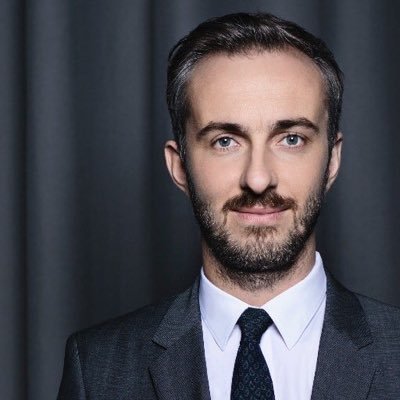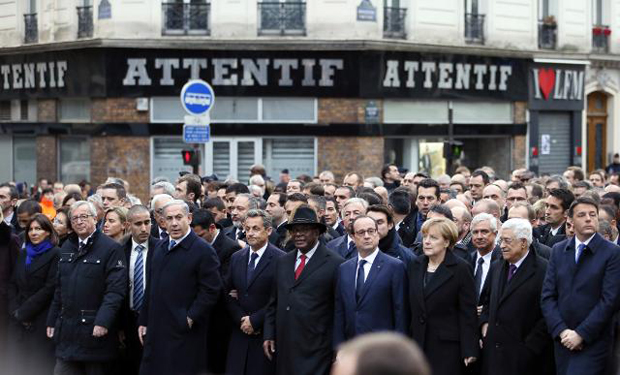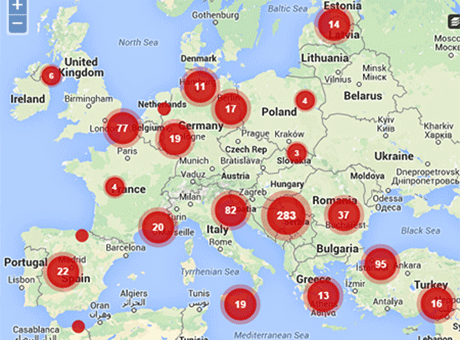7 Nov 2016 | Europe and Central Asia, Germany, Mapping Media Freedom, News and features
[vc_row][vc_column][vc_column_text]
What is worse: intelligence services gathering data without any legal basis or secret services operating within a legal framework that allows them to obtain vast amounts of personal information? This is the key question regarding Germany’s surveillance apparatus, as a new law regarding its foreign intelligence agency, the Federal Intelligence Service (BND), was passed through parliament on Friday 21 October.
Following the 2013 uncovering of the mass-scale surveillance by America’s National Security Agency, including details of the tapping of German chancellor Angela Merkel’s phone, there was a sense in German public debate that secret services were out of control. In early 2014, a parliamentary committee was established in the national chamber of the Bundestag to investigate the scale of surveillance activities of foreign intelligence in Germany. Attention soon shifted to the role of the BND, after former NSA employee Thomas Drake called the agency “an addendum appendix of the NSA” in his testimony to the committee in July of that year.
While the German government began the process to reform the legal framework of the BND, the governmentally-appointed officer for data protection and freedom of information took a closer look at the work of the service’s telecommunications unit in the southern town of Bad Aiblingen.
What it found was remarkable: across 60 pages, the expert report from March 2016 listed legal breaches by the BND. Although the intelligence service had been “repeatedly and heavily obstructing my work”, the officer was able to gain a picture full enough to pinpoint 18 “serious transgressions” and submit 12 official complaints, which, according to the investigative tech-blog Netzpolitik.org, is a record unrivalled by any governmental office in Germany to receive at one point in time.
Netzpolitik.org also made public the “top secret” labelled report in September.
Surveillance-critical civil society in the country may have been hopeful to see the intelligence service face consequences for past transgressions and future limitations for its activities. They were in for a surprise, though, as the BND law put forward in June this year proposed to legalise all surveillance activities that had thus far been taking place and further expand their scope additionally. The new law allows the foreign secret service thus-far illicit in-country surveillance.
In theory, any German-to-German communication would have to be excluded from surveillance, but two independent reports by experts, including one by Chaos Computer Club, found that online traffic does not carry a clearly discernible nationality. The constitutionally stipulated freedom of privacy of communication suddenly appears less convincing. It also follows that any non-EU national is not considered bearer of fundamental rights enjoyed, on paper, by anyone living in Germany, as all electronic communication including at least one foreign-based party can now be analysed and stored for up to six months, including all metadata. This will include foreign journalists and the sources they are in contact with. The previous 20%-rule, whereby the BND was limited to only intercept and analyse so much of the traffic available, was lifted altogether. The extended competencies were not left without a new and grand mission: surveillance can now take place to reap “insights into foreign and security policy [which] may be of relevance”.
Senior investigative journalist David Crawford spoke to Index on Censorship about an opportunity missed in the sense that the “legislative process had not been used as a forum what intelligence services should do but…to legalise practices that were already going on”. A “silent consensus” across the grand coalition seemed to exist and it appears that policy-makers close to the intelligence services had successfully dominated the reform process and delivered a law tailor-made for the BND.
Although the result may be unsatisfactory Crawford said that, in the German context, it was generally “positive to write down the rules of behaviour” for a practice that have been ongoing for decades and employed by more resourceful intelligence services worldwide. While especially the aspect of information sharing between foreign secret services appears worrying to Crawford, the investigative journalist points out that this professional group never had any “real protection, they are treated like any citizen” under German law. Thus, he emphasised that no journalist should pass the responsibility for safeguarding his or her sources to the state law or EU regulations: “It is up to the person to get the training they need, to put a lot of thought into how they can do this without somebody getting hurt”.
While extensive electronic surveillance by multiple states has to be reckoned with, regardless of a legal basis for the practices, the journalist should employ the right kinds of “tricks of the trade” to make sure that any whistleblower who helped uncover a story will, under no circumstances, suffer: “a lot of the time it is just going out meeting people, not using the phone, not even using the mail…I figure out a way to meet them, knocking on people’s doors or meeting them in a supermarket or somewhere, where you are unlikely to be monitored and they would feel a lot more comfortable talking…Use less technology, use a pencil, cite documents rather than announcing you have a whistleblower.”
According to Crawford, the lack of investigative journalism in general and the unawareness of some journalists engaging in serious investigative projects may be at the root of a sloppiness with the more time-consuming methods that the job requires in a reality of surveillance.
However, civil society activists maintained a responsibility of ethics reflected in legislation and protested with petitions and a solemn vigil on the evening prior to the final vote. As the law was being passed on the morning of Friday 21 October, the former liberal justice minister Sabine Leutheuser-Schnarrenberger announced constitutional charges against it. Meanwhile, the German intelligence service has other legal cases pending against it: the worldwide largest data transmission exchange business based in Frankfurt, DE-CIX, is seeking to get a “judicial review for the practices of telecommunication surveillance” for its customers. Another lawsuit filed by the German branch of Reporters Without Borders in June last year is based on the office for data’s annual report for 2014 and is seeking to defend all journalists and their sources against the transgression of the privacy of communication as an attack on press freedom.
[/vc_column_text][/vc_column][/vc_row][vc_row][vc_column][vc_basic_grid post_type=”post” max_items=”3″ grid_id=”vc_gid:1478541493543-29b41d55-076a-3″ taxonomies=”6564″][/vc_column][/vc_row]
15 Apr 2016 | Campaigns, Europe and Central Asia, Germany, mobile, Statements, Turkey, Turkey Statements

Jan Böhmermann
Index deplores the decision by German Chancellor Angela Merkel to authorise the prosecution of a German comedian for offending the president of Turkey.
Turkey requested that the German authorities prosecute Jan Böhmermann after the comedian read out a deliberately offensive poem about Turkey’s President Recep Tayip Erdogan. Under German law, it is a crime to insult foreign heads of state. Erdogan, who has cracked down heavily on critics of his regime – including journalists in the past 12 months – also launched a private lawsuit against Böhmermann.
“It is shocking that the head of state of one country should be able to demand the prosecution of a citizen in another country for speaking freely,” said Index on Censorship CEO Jodie Ginsberg. “No one – and especially heads of state – has a right not to be offended and the implications for free expression worldwide if Mr Bohmermann were convicted are severe.”
Turkey’s crackdown on media freedom has been well-documented by Index on Censorship’s Mapping Media Freedom project, which has recorded 214 reports about the country since May 2014. The increasingly autocratic Erdogan regime has recently Turkey’s courts to seize control of the Zaman Media Group.
Also: read British stand-up Shazia Mirza and Indonesian comedian Sakdiyah Ma ‘ruf discussing comedy and censorship for Index. Mirza hosted the Index on Censorship awards this week, and Ma ‘ruf was shortlisted for an award.
1 May 2015 | Denmark, European Union, France, Germany, Greece, Hungary, Ireland, Italy, Macedonia, mobile, News and features, Poland, Spain, Turkey, Ukraine, United Kingdom

As we approach World Press Freedom Day, the right to freedom of expression will again be celebrated as an inalienable European value across the continent — by the public, the media and politicians alike. But to many, this will mean little more than engaging in a well trodden mental routine. We hardly consider the difficulties that freedom of expression faces in practice.
In the first part of 2015, more than a third of journalist killings in the word took place in two European countries; France and Ukraine. If it is true that Europe’s reactions to the Charlie Hebdo attack — the majority of them very emotional — were salubrious, they simultaneously gave rise to ambiguous situations. Many of the leaders that will on 3 May reaffirm their commitment free expression, supported the same message by taking part in the historic march in Paris on 11 January.
But upon seeing Angela Merkel, some were also reminded that Germany continues to treat blasphemy as a crime — as do Denmark, Spain, Poland and Greece, among others. Ireland, whose Enda Kenny was also in attendance, has a constitution which specifically mentions blasphemy and in 2010 enacted a new law against it. All these European countries defend themselves by saying that they do not apply their laws against “blasphemers”. That argument does not carry much weight when it comes to opposing those countries — Saudi Arabia, Iran, various Asian countries — that have tried to turn blasphemy into a universal crime recognised by the UN.
Spain’s Mariano Rajoy too marched in solidarity, but his government has taken steps to promote changes in the penal code that would “represent a serious threat to freedom of information, expression and the press”.
And what was Viktor Orban doing in Paris? The Hungarian president has reunified Hungary‘s public media so as to better bind them to his own party. Despite being the leader of an EU country, Orban has followed Vladimir Putin’s example. In this experimental model, the Andrei Sakharov Center and Museum is no longer ordered to close as it was in the old days, but rather fined 300,000 roubles (€5,000) for failing to register as a “foreign agent”. One day brings an announcement of compulsory registration for bloggers in Russia; another day, harassment against Russian and Hungarian NGOs perceived as “unpatriotic”.
Turkish Prime Minister Ahmet Davutohlu traveled to Paris, only to later label Charlie Hebdo’s post-attack issue a “provocation”. A reminder: Turkey is an EU candidate country where dozens of journalists have been sentenced to prison, and where various internet sites, including those that dared to reproduce some of Charlie Hebdo’s caricatures, have been blocked.
But also present at the march, were various representatives of European journalists — myself included. Just behind the Charlie Hebdo survivors, we carried a banner with the message “Nous sommes Charlie”.
Walking next to me was Franco Siddi, of the Italian National Press Federation. He talked to me about how imprisonment for defamation is still a possibility in Italy, though the European Court of Human Rights has ruled it a disproportionate punishment.
In my home country Spain too, this possibility of imprisonment remains, even if under Spanish jurisprudence freedom of expression consistently prevails over the demands of plaintiffs. In Italy, the situation is the same, yet my Italian colleagues point out that in 2014 alone, 462 journalists in the country were threatened with legal action for alleged acts of defamation. And while the current proposal for reform being considered foresees eliminating the possibility of jail time, it increases the potential fines.
This is not the only potential legal threat facing European journalists. Long before 9/11, there existed a reflexive habit of passing “urgent” laws under security pretexts, as in the UK during the most difficult years of the Northern Ireland conflict. The current model is the United States’ Patriot Act, which has recently been discussed in France. Meanwhile, in Britain and Spain are debating what free expression activists describe as “gag laws”. In Macedonia, the sentencing of the investigative journalist Tomislav Kezarovski to two years in prison under one of these security inspired laws stands out as a warning sign.
Against this worrying backdrop, across Europe journalists, freedom advocates, campaigners and even politicians are standing up for press freedom. When Gvozden Srecko Flego, member of the Parliamentary Assembly of the Council of Europe, recently highlighted the cases of Russia, Ukraine, Turkey and Azerbaijan as particularly problematic, he also suggested a countermeasure. He recommends “organising annual debates […], with the participation of journalists’ organisations and media outlets” in the respective parliaments of each state.
Media concentration, one of the most serious challenges to media pluralism and free expression in Europe, is being tackled. One proposal, which some international bodies have already accepted, would create a “Media Identity Card” requiring owners to publicly identify themselves and thus create an environment of more open and transparent media ownership.
When defending freedom of expression as a European value, we cannot allow ourselves to simply fall in into mental routines. This World Press Freedom Day we need both words and actions.
Paco Audije is a member of the Steering Committee of the European Federation of Journalists (EFJ)
World Press Freedom Day 2015
• Media freedom in Europe needs action more than words
• Dunja Mijatović: The good fight must continue
• Mass surveillance: Journalists confront the moment of hesitation
• The women challenging Bosnia’s divided media
• World Press Freedom Day: Call to protect freedom of expression
This column was posted on 1 May 2015 at indexoncensorship.org
21 Jan 2015 | Azerbaijan, Azerbaijan Letters, Campaigns, Germany, Statements
Chancellor Angela Merkel
Bundeskanzleramt
Willy-Brandt-Straße 1
10557 Berlin
Madam Chancellor,
As members of the international NGO coalition ‘Sport for Rights’ we are appealing to you to make human rights a central subject in your meeting next Wednesday, 21 January 2015, with president Ilham Aliyev of Azerbaijan.
In recent years, space for political activity and for civil society and journalism in Azerbaijan has gradually been curtailed, and the last six months in particular have witnessed a severe and unprecedented crackdown, with dozens of civil society activists and journalists serving or awaiting sentencing. The country’s most prominent investigative journalist and a number of leading human rights defenders are in prison, punished for their criticism of government policies. Sham charges such as ‘tax evasion’ are used to justify the criminalization of fundamental rights and freedoms.
The ‘Sport for Rights’ coalition has been established to raise this issue in the context of the forthcoming international sporting events to be hosted by Azerbaijan. Against a backdrop of systematic state-sponsored repression, these events will fail to reflect the spirit in which they were established. The next major sporting event is the Baku European Games, designed and regulated by the European Olympic Committees, scheduled for June 2015. A policy shift by the Azerbaijan towards an open society is urgently required if these Games are to be a success. Human rights defenders and journalists must be released, and we urge you to emphasize this point in your conversations with President Aliyev.
This issue is all the more important given that Azerbaijan is a member of the European community of nations: the country is a member of the Council of Europe (CoE), and part of the EU’s Eastern Partnership Initiative. By ratifying the European Human Rights Convention, Azerbaijan has made a commitment under international law to respect the fundamental freedoms contained therein. CoE officials have repeatedly called attention to Azerbaijan’s failure to uphold these freedoms for its citizens. In his retrospective on 2014, Nils Muiznieks, the CoE Human Rights Commissioner, declared:
One of the most difficult situations I have observed is in Azerbaijan, where the authorities are engaging in a systematic crackdown on human rights defenders, media professionals and civil society partners of the Council of Europe. The number of those in detention there or in exile continues to grow.
President Aliyev may point to token releases that take place from time to time – but please remember that not only are these rare, they are issued only after innocent people have served time in prison, losing months and years of their lives for exercising their basic rights to freedom of expression and association.
Among those unjustly arrested or convicted in 2014 are:
- Anar Mammadli and Bashir Suleymanli, co-founders of the Election Monitoring and Democracy Studies Centre – Mammadli and Suleymanli were arrested on 16 December 2013 and then sentenced to 5.5 and 3.5 years respectively in May 2014, following outspoken criticism of Azerbaijan’s presidential elections in October 2013. On 29 September 2014, Mammadli was awarded the Václav Havel Award for Human Rights by the Parliamentary Assembly of the Council of Europe.
- Leyla Yunus, Director of the Azerbaijan Institute of Peace and Democracy – Yunus was arrested on 30 July2014, and has remained in pre-trial detention since then, despite serious concerns about her health. She was awardedthe 2013 Theodore Hecker Award in Esslingen-am-Neckar “for her self-sacrificing contribution to the protection of human rights and civil freedoms in Azerbaijan.” Her husband Arif Yunus, Head of the Department of Conflict and Migration Institute of Peace and Democracy in Azerbaijan, Ph.D., a historian specializing in conflict studies, was arrested on 6 August 2014.
- Rasul Jafarov, one of the initiators and coordinators of the “Sing for Democracy” (2012) and “Art for Democracy” (2013) campaigns – Jafarov was arrested on 2 August2014 and has remained in detention since. His trial began on 15 January 2015.
- Intigam Aliyev, human rights defender and lawyer – Aliyev was has been in detention since his arrest 8 August 2014. In his capacity as a lawyer he has specialized in defending rights of citizens in the European Court of Human Rights. At the time of his arrest, he was dealing with over 100 cases pending before the Court.
- Khadija Ismayilova, investigative journalist; radio host for Radio Free Europe/Radio LibertyAzerbaijani service; member of the Organized Crime and Corruption Reporting Project – Ismayilova was arrested on 5 December 2014.
We ask you to unequivocally remind Azerbaijan of its obligations under the European Convention on Human Rights. Azerbaijan’s partners should insist that this terrible stainon the country’s human rights record is removed before Baku plays host to the European Games, and that these people be released immediately and unconditionally. Full execution of European Court of Human Rights should also be requested from Azerbaijan in this regard, aiming at amending legislation criminalising human rights defenders in line also with recommendations of the CoE Venice Commission.
We sincerely hope that we can count on your principled leadership on this urgentmatter. We thank you for your attention to the concerns set forth herein.
NGO coalition “Sport for Rights”, including:
- Centre for Civil Liberties (Ukraine)
- Helsinki Foundation for Human Rights (Poland)
- Index on Censorship (Great Britain)
- International Partnership for Human Rights (Belgium)
- Netherlands Helsinki Committee (The Netherlands)
- Norwegian Helsinki Committee (Norway)
- People in Need (Czech Republic)
- Platform (Great Britain)
- Youaid Foundation (Poland)
- A group of civil society activists from Azerbaijan who wish to remain anonymous out
of concern for the security of their family members




